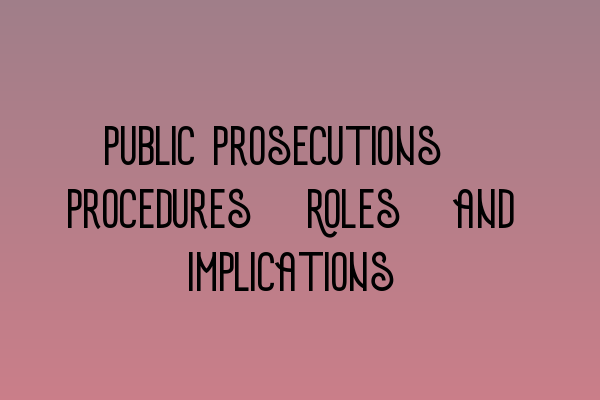Public Prosecutions: Procedures, Roles, and Implications
The Importance of Public Prosecutions
Public prosecutions play a crucial role in the criminal justice system. They ensure that individuals who have allegedly committed crimes are brought to justice, and they provide a sense of accountability and deterrence in society. In the UK, public prosecutions are conducted by the Crown Prosecution Service (CPS), which works closely with law enforcement agencies to build strong cases against defendants.
Procedures in Public Prosecutions
The procedures involved in public prosecutions are designed to ensure fairness and uphold the principles of justice. The process typically begins with the gathering of evidence by law enforcement agencies. This evidence is then presented to the CPS, who will determine whether there is enough evidence to proceed with the prosecution.
If the CPS decides to move forward with the case, they will file charges against the defendant and prepare for the trial. This includes gathering additional evidence, interviewing witnesses, and consulting with experts if necessary. The defendant is then formally notified of the charges and given an opportunity to respond.
During the trial, both the prosecution and defense present their arguments and evidence before a judge or jury. The prosecution has the burden of proving the defendant’s guilt beyond a reasonable doubt. If the defendant is found guilty, they will be sentenced based on the severity of the crime.
Roles in Public Prosecutions
Various roles are involved in public prosecutions, each with specific responsibilities. These roles include:
- Prosecutor: The prosecutor, often a barrister or solicitor, represents the state and presents the case against the defendant. They work closely with the CPS to gather evidence, interview witnesses, and present arguments during the trial.
- Judge: The judge presides over the trial and ensures that the proceedings are conducted fairly. They interpret and apply the law, instruct the jury on legal matters, and ultimately deliver the verdict and sentence if the defendant is found guilty.
- Defense Counsel: The defense counsel, also a barrister or solicitor, represents the defendant and aims to protect their rights and interests. They challenge the prosecution’s evidence, present counterarguments, and advocate for their client’s innocence.
- Jury: In some cases, a jury is present to decide the defendant’s guilt or innocence. Jurors are selected from the community and must impartially consider the evidence presented during the trial.
Implications of Public Prosecutions
Public prosecutions have far-reaching implications for both individuals and society as a whole. For individuals accused of crimes, the outcome of a prosecution can significantly impact their lives. A conviction may result in imprisonment, fines, or other penalties, while an acquittal brings freedom and the opportunity for a fresh start.
Public prosecutions also contribute to the maintenance of law and order in society. They serve as a deterrent to potential criminals and send a message that illegal behavior carries consequences. Additionally, public prosecutions help protect the rights of victims and ensure that justice is served.
Conclusion
Public prosecutions are a vital part of the criminal justice system, ensuring that alleged offenders are held accountable for their actions. The procedures involved, the roles of various individuals, and the implications for both individuals and society highlight the importance of fair and effective public prosecutions.
